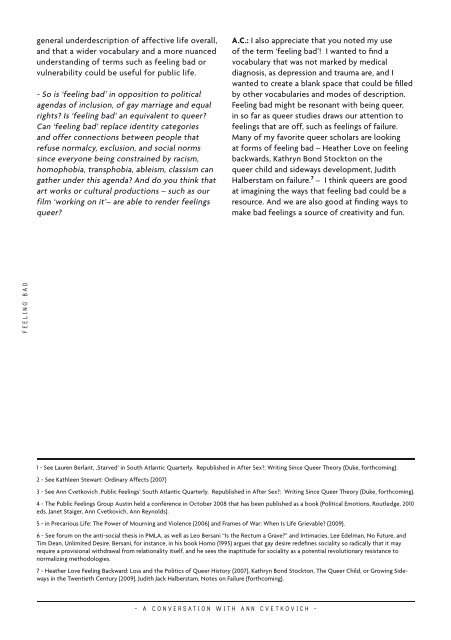a conversation with ann Cvetkovich - karin michalski
a conversation with ann Cvetkovich - karin michalski
a conversation with ann Cvetkovich - karin michalski
You also want an ePaper? Increase the reach of your titles
YUMPU automatically turns print PDFs into web optimized ePapers that Google loves.
feeling bad<br />
general underdescription of affective life overall,<br />
and that a wider vocabulary and a more nuanced<br />
understanding of terms such as feeling bad or<br />
vulnerability could be useful for public life.<br />
- So is ‘feeling bad’ in opposition to political<br />
agendas of inclusion, of gay marriage and equal<br />
rights? Is ‘feeling bad’ an equivalent to queer?<br />
Can ‘feeling bad’ replace identity categories<br />
and offer connections between people that<br />
refuse normalcy, exclusion, and social norms<br />
since everyone being constrained by racism,<br />
homophobia, transphobia, ableism, classism can<br />
gather under this agenda? And do you think that<br />
art works or cultural productions – such as our<br />
film ‘working on it’– are able to render feelings<br />
queer?<br />
- a COnveRSaT i O n wiT h a nn CveT k O viC h -<br />
a.c.: I also appreciate that you noted my use<br />
of the term ‘feeling bad’! I wanted to find a<br />
vocabulary that was not marked by medical<br />
diagnosis, as depression and trauma are, and I<br />
wanted to create a blank space that could be filled<br />
by other vocabularies and modes of description.<br />
Feeling bad might be resonant <strong>with</strong> being queer,<br />
in so far as queer studies draws our attention to<br />
feelings that are off, such as feelings of failure.<br />
Many of my favorite queer scholars are looking<br />
at forms of feeling bad – Heather Love on feeling<br />
backwards, Kathryn Bond Stockton on the<br />
queer child and sideways development, Judith<br />
Halberstam on failure. 7 – I think queers are good<br />
at imagining the ways that feeling bad could be a<br />
resource. And we are also good at finding ways to<br />
make bad feelings a source of creativity and fun.<br />
1 - See Lauren Berlant, ‚Starved’ in South Atlantic Quarterly. Republished in After Sex?: Writing Since Queer Theory (Duke, forthcoming).<br />
2 - See Kathleen Stewart: Ordinary Affects (2007)<br />
3 - See Ann <strong>Cvetkovich</strong> ‚Public Feelings’ South Atlantic Quarterly. Republished in After Sex?: Writing Since Queer Theory (Duke, forthcoming).<br />
4 - The Public Feelings Group Austin held a conference in October 2008 that has been published as a book (Political Emotions, Routledge, 2010<br />
eds. Janet Staiger, Ann <strong>Cvetkovich</strong>, Ann Reynolds).<br />
5 - in Precarious Life: The Power of Mourning and Violence (2006) and Frames of War: When Is Life Grievable? (2009).<br />
6 - See forum on the anti-social thesis in PMLA, as well as Leo Bersani “Is the Rectum a Grave?” and Intimacies, Lee Edelman, No Future, and<br />
Tim Dean, Unlimited Desire. Bersani, for instance, in his book Homo (1995) argues that gay desire redefines sociality so radically that it may<br />
require a provisional <strong>with</strong>drawal from relationality itself, and he sees the inaptitude for sociality as a potential revolutionary resistance to<br />
normalizing methodologies.<br />
7 - Heather Love Feeling Backward: Loss and the Politics of Queer History (2007), Kathryn Bond Stockton, The Queer Child, or Growing Sideways<br />
in the Twentieth Century (2009), Judith Jack Halberstam, Notes on Failure (forthcoming).


